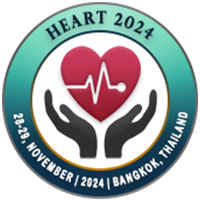
Dereje Bayissa Demissie
Ethiopian Public Health Institute, EthiopiaTitle: The Magnitude of 30-Day Readmission and Factors Associated with Patients Underwent Cardiac Surgery in Tikur Anbessa Specialized Hospital Cardiac Center, Ethiopia
Abstract
Introduction: Early hospital readmissions after cardiac operations are common, can vary from 7% to 21%, and are likely related to patient co-morbidity and perioperative care. Hospital readmissions are costly and potentially avoidable. Reducing hospital readmissions after cardiac surgery is necessary as part of the solution to improving efficiency in health care.
Methods: An institution-based retrospective chart review was conducted among 324 patients’ charts with the complete document from October 2013 to October 2020. The data were analyzed using SPSS. Both binary and multiple logistic regressions were run to identify associated factors at. PV<0.05 with a 95% confidence interval (CI), which was considered statistically significant.
Results: The overall readmission rate was 8.0%. Fifty-one (15.7%) patients had mitral regurgitation history before surgery. About 207 (63.9%) patients were admitted with the preoperative diagnosis of chronic rheumatic valvular heart disease. Mitral valve (MV) replacement was done in 110 (34%), MV repair in 64 (19.8%), and atrial septal defect closure in 36 (11.1%). This study revealed that pericardial effusion was most common, accounting for 2.4%. Patients who were currently or ever smokers [adjusted odds ratio (AOR) 11.57, 95% CI (1.87–75.16.6)], obese patients [AOR 14.0, 95% CI (1.11–176.3)], and patients whose length of hospital stay (LOS) was 10–14 days post-operatively [AOR 4.89, 95% CI (1.83–13.06)] were identified as factors that increase the likelihood of 30-day readmission among patients who underwent cardiac surgery.
Conclusion: The magnitude of 30-day readmission after cardiac surgery in Tikur Anbessa Specialized Hospital Cardiac Centre, Ethiopia, was moderate, with identified factors of left ventricular ejection fraction, obese patients, history of smoking, history of dyslipidemia, postoperative LOS, and postoperative inotropic drug need all increasing the likelihood of readmission within 30 days after cardiac surgery. Therefore, policymakers and health planners would develop strategies and protocol guidelines to improve the quality of cardiac surgery and prevent readmission after cardiac surgery.
Biography
TBA Soon...

